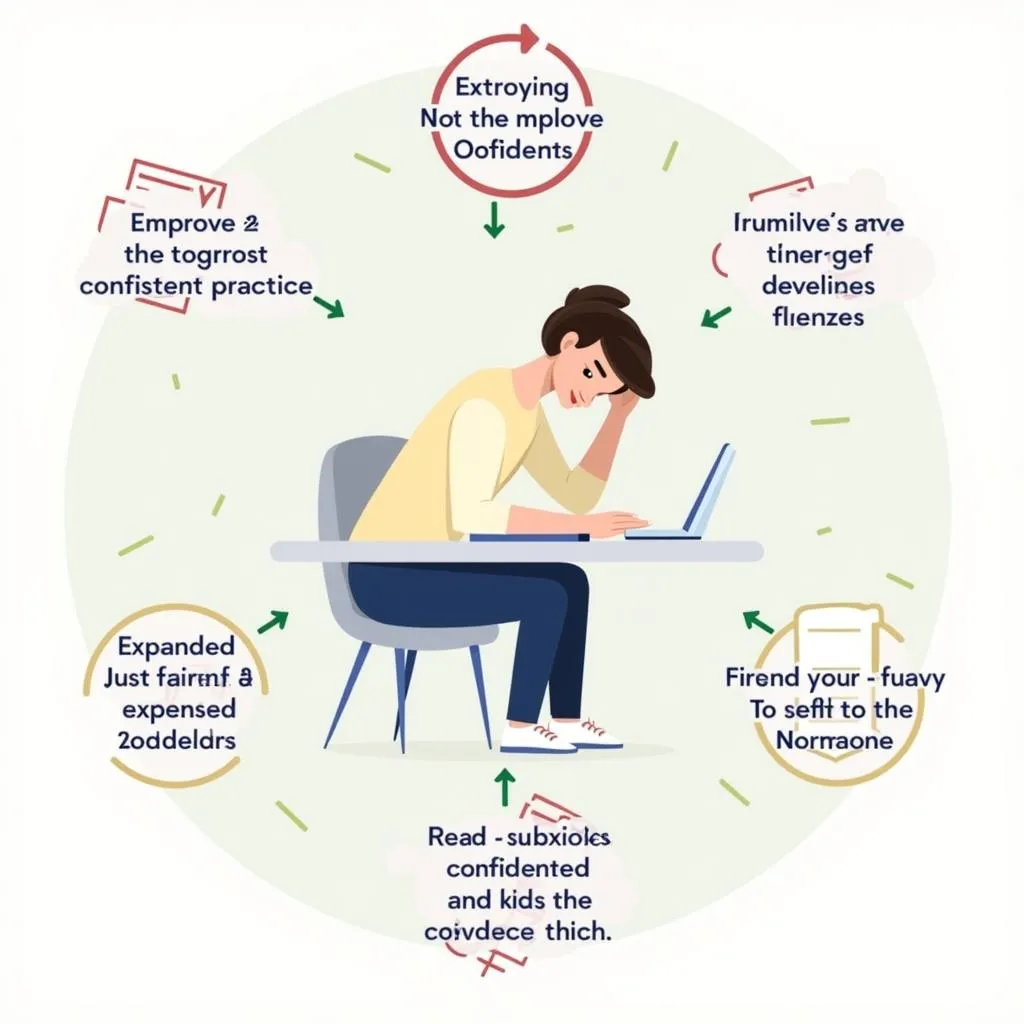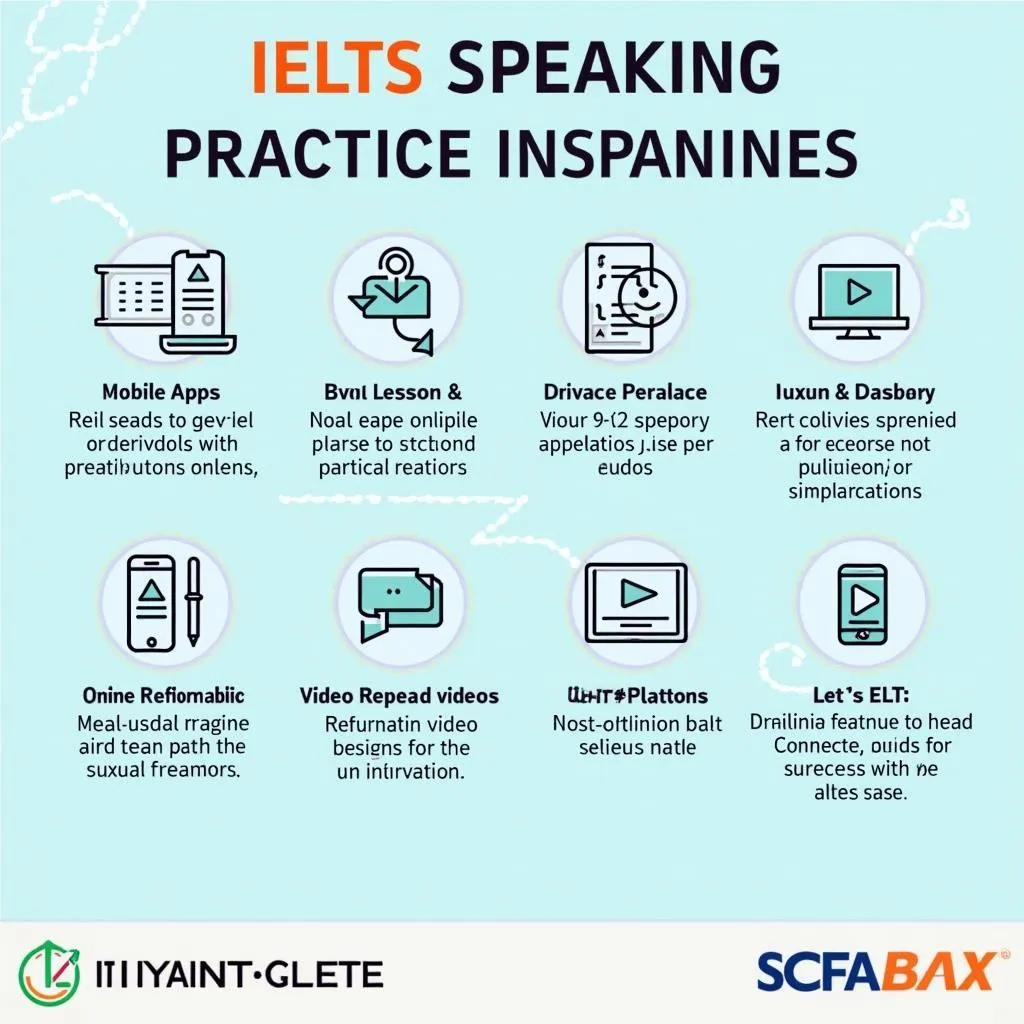Why IELTS Speaking Practice is Crucial
IELTS Speaking is a vital component of the IELTS exam, testing your ability to communicate effectively in English. Regular practice is essential to improve your fluency, expand your vocabulary, and build confidence. This article will explore various IELTS Speaking practice ideas to help you excel in this section of the test.
The Importance of Consistent Practice
Consistent practice is key to improving your IELTS Speaking skills. By engaging in regular speaking exercises, you can:
- Enhance your fluency and reduce hesitation
- Broaden your vocabulary and improve pronunciation
- Develop strategies for handling different question types
- Boost your confidence in speaking English
 The importance of IELTS Speaking practice
The importance of IELTS Speaking practice
Effective IELTS Speaking Practice Ideas
1. Mirror Practice
Mirror practice is a simple yet effective technique to improve your speaking skills:
- Stand in front of a mirror and speak on various IELTS topics
- Observe your facial expressions and body language
- Focus on maintaining eye contact with yourself
- Record your sessions to review later and track progress
This method helps you become more aware of your non-verbal communication and builds confidence in your speaking abilities.
2. Language Exchange Partners
Finding a language exchange partner is an excellent way to practice IELTS Speaking:
- Use language exchange websites or apps to find partners
- Schedule regular speaking sessions
- Take turns asking and answering IELTS-style questions
- Provide constructive feedback to each other
This approach allows you to practice with real conversations and gain exposure to different accents and speaking styles.
3. IELTS Speaking Apps and Online Resources
Utilize technology to enhance your IELTS Speaking practice:
- Download IELTS Speaking practice apps
- Use online platforms that offer mock IELTS Speaking tests
- Engage with AI-powered speaking practice tools
- Watch IELTS Speaking video lessons and sample interviews
These resources provide structured practice and immediate feedback, helping you identify areas for improvement.
 IELTS Speaking practice resources
IELTS Speaking practice resources
4. Topic-based Monologues
Develop your ability to speak at length on various topics:
- Choose a random IELTS Speaking Part 2 topic
- Prepare for 1 minute, then speak for 2 minutes without interruption
- Record your monologue and analyze it for fluency, coherence, and vocabulary
- Practice regularly with different topics to improve your range
This exercise helps you organize your thoughts quickly and speak coherently on diverse subjects.
5. Role-play Scenarios
Engage in role-play exercises to practice real-life communication:
- Create scenarios based on common IELTS Speaking topics (e.g., travel, education, work)
- Practice with a partner or in a group
- Take turns playing different roles (e.g., customer, shopkeeper, interviewer)
- Focus on using appropriate language and maintaining natural conversation flow
Role-play helps you develop adaptability and improves your ability to communicate in various contexts.
6. Shadowing Technique
The shadowing technique involves mimicking native speakers:
- Choose an English audio or video clip (preferably IELTS-related content)
- Listen to the audio and repeat what you hear, matching the speaker’s pace and intonation
- Focus on pronunciation, stress, and rhythm
- Gradually increase the difficulty of the content as you improve
This method enhances your pronunciation, intonation, and overall speaking fluency.
Important Tips for IELTS Speaking Practice
Consistency is Key
- Set aside dedicated time for daily speaking practice
- Create a study schedule and stick to it
- Track your progress to stay motivated
Focus on Weak Areas
- Identify your weaknesses (e.g., grammar, vocabulary, pronunciation)
- Develop targeted exercises to address these areas
- Seek feedback from teachers or language partners
Expand Your Vocabulary
- Learn new words and phrases related to common IELTS topics
- Practice using these words in context during your speaking sessions
- Review and revise vocabulary regularly
Work on Pronunciation
- Pay attention to individual sounds, word stress, and sentence intonation
- Use pronunciation apps or online resources for guidance
- Record yourself and compare your pronunciation with native speakers
Manage Stress and Anxiety
- Practice relaxation techniques before speaking exercises
- Visualize successful speaking scenarios
- Remember that making mistakes is part of the learning process
Next Steps in Your IELTS Speaking Journey
To continue improving your IELTS Speaking skills:
- Take regular mock IELTS Speaking tests to assess your progress
- Join IELTS study groups or online forums to share experiences and tips
- Consider working with an IELTS tutor for personalized feedback and guidance
- Stay updated with current affairs to discuss a wide range of topics confidently
- Challenge yourself by participating in English-speaking events or competitions
By implementing these IELTS Speaking practice ideas and tips, you’ll be well-prepared to tackle the IELTS Speaking test with confidence and achieve your desired score. Remember, consistent practice and a positive attitude are key to success in IELTS Speaking. Keep refining your skills, and you’ll see significant improvement in your English speaking abilities.


